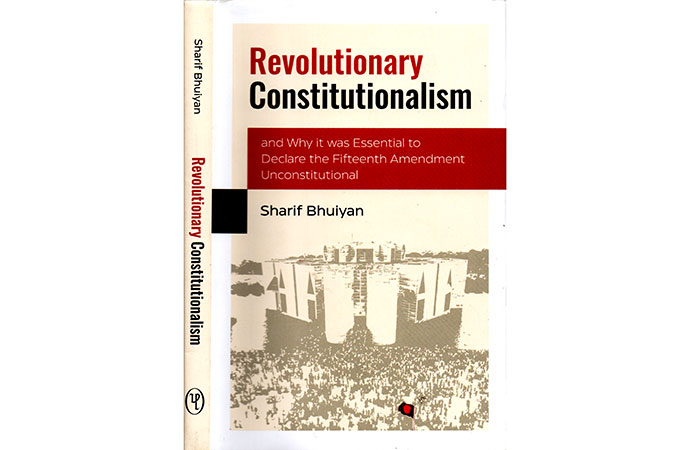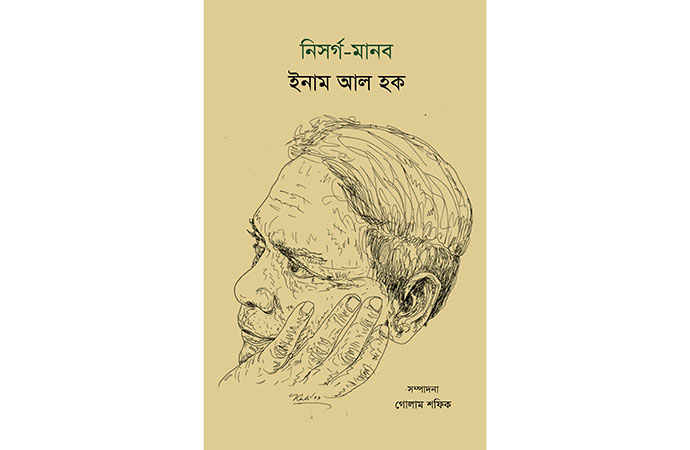Column

The interim government is the first of its kind in the annals of Bangladesh's history. It is not a caretaker government. It is not a military government. It is not an elected government. It is operating in a parliamentary vacuum amid a revolution and a constitutional crisis. Dr. Sharif Bhuiyan's timely book on the legal dimensions of the interim government is an authoritative analysis of the legality and constitutionality of the government led by Nobel laureate Muhammad Yunus. The book contains an insider's account of the key moments in Bangladesh's constitutional crisis which began with Sheikh Hasina's abolition of the election-time caretaker system in 2011 and culminated in Hasina's downfall and escape to India in 2024.
Dr. Sharif Bhuiyan was appointed to the Constitution Reform Commission after the revolution of 2024. With a doctorate from Cambridge and trained by Dr. Kamal Hossain who chaired the Constitution Drafting Committee in 1972; Dr. Bhuiyan made a name for himself as one of the top commercial lawyers of Bangladesh before his foray into public service. His book establishes the legal basis of the interim government. It has four chapters. The first three chapters are devoted to questions of constitutional legitimacy, including the doctrine of necessity, the tenure of the interim government, and vacancies in key constitutional posts. The fourth chapter includes his arguments in court which sought to declare the Fifteenth Amendment as illegal and void. Dr. Bhuiyan argues that Bangladesh finds itself in a novel situation. The Constitution is not a holy book, he argues. The Constitution should be interpreted in line with a set of basic principles, namely democracy. He taps into the precedent set by courts in the past, including the Dhaka High Court's diction on the doctrine of necessity in 1963.
Some of the more interesting aspects of his book include an account of what transpired in the parliamentary committee which was responsible for drafting the Fifteenth Amendment. The committee supported the system of election-time caretaker governments. However, at the last-minute insistence of former Prime Minister Sheikh Hasina, the committee was forced to abandon its recommendations. The committee also consulted with civil society representatives who supported retaining the caretaker system. But the Prime Minister disregarded everyone and pushed ahead with abolishing the provisions for a caretaker government.
The drafting and enactment of the Fifteenth Amendment violated the established norms of constitutional procedure, with no long title for the Bill and no referendum being held. Dr. Bhuiyan argues that the Fifteenth Amendment was blatantly abusive of due process. He described the Fifteenth Amendment as an attack on the basic structure of the Constitution.
Dr. Bhuiyan is not an originalist in the sense that he believes the provisions of the 1972 Constitution necessarily form the basic structure doctrine. In his interpretation, the basic structure doctrine is embodied by certain principles and provisions in the written Constitution; as well as the extensive body of constitutional law produced by courts for decades to support the interpretation of the written Constitution.
Dr. Bhuiyan also calls out the 'necrocracy' of the Fifteenth Amendment. He describes the personality cult of Sheikh Mujibur Rahman, which was embedded into the Constitution, as a form of worship for a dead leader. North Korea reveres the dead Kim Il Sung as its Eternal President. He compares the North Korean scenario with Sheikh Hasina's Bangladesh.
The Fifteenth Amendment also made one thirds of the Constitution unamendable. Dr. Bhuiyan and others, including the late Attorney General Mahmudul Islam, have argued that no parliament can bind a successor parliament. Constitutions are meant to evolve because laws change over time to reflect the changing realities of society.
The Fifteenth Amendment was never a serious effort at constitutional reform. It was instead aimed at corrupting the electoral system of the country. Bangladesh's politicians lost a golden opportunity to bring about genuine constitutional reform through a parliamentary consensus. The disputed constitution created by the Fifteenth Amendment led to a prolonged constitutional crisis, the revolution of 2024, and the creation of the interim government led by Muhammad Yunus.
Umran Chowdhury is Assistant Editor of the Dhaka Courier and a Research Associate at the Cosmos Foundation and Bay of Bengal Institute.

























Leave a Comment
Recent Posts
Religion and Politics: A Toxic ...
At Dhaka University, cafeteria workers have been told not to wear shor ...
Enayetullah Khan joins AsiaNet ...
AsiaNet’s annual board meeting and forum was held in Singapore, ...
In a New York minute
Many leaders back a UN call to address challenges to ..
Defaulted loans at Non-Bank Financial Institutions ( ..
How the late Zubeen Garg embodied cultural affinitie ..